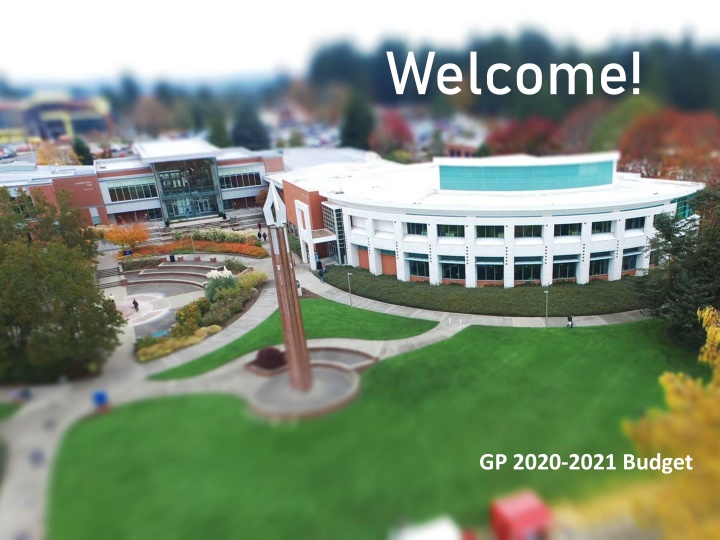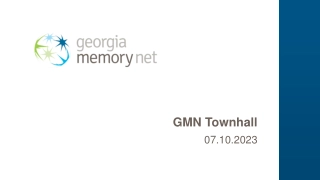
Empowering Data Infrastructure for Culturally Relevant Education
This proposal outlines initiatives at Clark College for the 2020-2021 academic year to enhance data infrastructure, implement culturally relevant curriculum, and acknowledge indigenous lands. The plan includes establishing a data warehouse for improved analytics, enhancing enrollment management processes, and providing data literacy support across campus. The aim is to align institutional goals with effective data practices and enhance student outcomes through culturally responsive teaching.
Download Presentation

Please find below an Image/Link to download the presentation.
The content on the website is provided AS IS for your information and personal use only. It may not be sold, licensed, or shared on other websites without obtaining consent from the author. If you encounter any issues during the download, it is possible that the publisher has removed the file from their server.
You are allowed to download the files provided on this website for personal or commercial use, subject to the condition that they are used lawfully. All files are the property of their respective owners.
The content on the website is provided AS IS for your information and personal use only. It may not be sold, licensed, or shared on other websites without obtaining consent from the author.
E N D
Presentation Transcript
Welcome! GP 2020-2021 Budget
Land Acknowledgement We acknowledge that we live and work on the ancestral lands of the Cowlitz and Lower Columbia Peoples. Truth and acknowledgment are critical to building mutual respect and connection across all barriers of heritage and difference. We pay respects to the indigenous elders, past and present, as we respectfully consider the many legacies of violence, erasure, displacement, migration, and settlement that bring us together today. We also acknowledge that our nation has benefited and profited from the free enslaved labor of Black people. We honor the legacy of the African diaspora and Black life, and the knowledge, skills, and human spirit that persevere in spite of violence and White supremacy.
Culturally Relevant Curriculum Miles Jackson Culturally responsive teaching is using the cultural knowledge, prior experiences, frames of reference, and performance styles of ethnically diverse students to make learning encounters more relevant to and effective for them (Gay, 2010, p. 31). Goal: Integrate culturally relevant curriculum and teaching practices into high-demand transfer and CTE courses Outcome: Culturally relevant curriculum and teaching practices are embedded in high-demand courses in multiple departments; equity gaps in student outcomes are reduced Assessment: Evaluate the number of class sections in which the culturally relevant content and teaching practices are implemented and track impact on equity gaps in course outcomes Proposed cost estimates, stipends and benefits: Faculty mentors (8-10) $20,000 Department faculty teams (8-10) $55,000 Reference: Gay, G. (2010). Culturally Responsive Teaching: Theory, Research, and Practice. Teachers College Press.
Data Infrastructure Plan Dr. Rosalie Roberts Currently, various user data needs are unmet. With ongoing efforts to improve the data landscape, and create feasible and sustainable systems with fewer staff, and changes in software, this is an excellent time to establish the foundational architecture of our data systems across campus. This project aims to clarify the scope and priorities related to data needs and align the Clark College mission and institution-level strategic goals with feasible, sustainable, and effective processes and presentation of data. These will be simultaneous and the proposal team, Mirranda, Rosalie, and Angela, will provide communication to EC representatives and campus as well as coordinate documentation for the state. Success Criteria Project #1 Data Warehouse Increased capacity to create Tableau dashboards. Increased availability of demographic data. Sustainable data architecture for multiple uses. Finished Retention/completion dashboard, results disaggregated by race. Upgraded course success dashboard with course-to-course success rates. Retention/completion intervention report based on analytics. Quality Accessible Project #2 Enrollment Management Improved automation of data input processes. Academic Advisement Report implementation (AAR). Annual class schedule and enrollment cycle informed by data from program enrollment, sub-plans and AAR reports. Auto-enrollment. Implementation of the annual schedule, data driven class scheduling and enrollment cycle. Implementation of the Appreciative Advising Model. Ethical & Secure Equity- Project #3 Data Literacy Coaches Improved data literacy and outcomes assessment practices and documentation across campus. Increase in views on Tableau dashboards. Increase in use of Tableau dashboards in internal reports of every kind. Trained data coaches, professional development opportunities for all campus members. informed Strategic
Culturally Relevant Orientation Vanessa Watkins Goals/Outcomes: Students see themselves represented in orientation Students know of the resources available to them and how to access them Students have a stronger sense of belonging to the college and its community Potential methods: Student stories/videos Adding an emphasis on culturally relevant information to each of the main four modules in orientation Others, tbd. Orientation meetings on Feb 18 & 22 will focus on this topic and lend to a more robust and workable plan to implement.
Open Educational Resources (OER) Dr. Michael Brown Plan Overview Marketing Outreach Create and OER webpage to increase awareness and application to inform faculty, staff, and students. Create a student success workshop through ASCC to inform students of OER and zero cost materials. Support Hire seasonal bookstore support staff to correctly code to ensure students can ID when OER materials are available. Hire OER accessibility specialist to review OER materials to ensure OER materials meet disability guidelines and are equitably accessible by all. Faculty/Staff Development Create a Faculty Showcase in collaboration with the Teaching and Learning Center to highlight early adopters. Faculty Development - OER Institute. Provide an in- house faculty development OER institute. Emphasis on pedagogy, not just open materials. Participants (faculty) will learn innovative ways to create and implement high- quality OER instructional materials. Successful training and development would focus on using OER/Zero-cost materials in tandem with: Culturally responsive and sustaining pedagogies Trauma-informed pedagogies, Open pedagogy, Asset pedagogies ; incorporating OER/ZTC materials with backwards design/pedagogical purpose. Upon completion of OER training, faculty who agree to convert one course to becoming zero textbook cost (ZTC) will receive a stipend. Outcome: Clark students will have access to more affordable education through less expenses in textbooks and materials.
Kelly Love / Kevin Damore & Chandra Chase Marketing & Communications Running Start Posted the two RS student consultant positions Received our Digital Marketing PPC project proposal from Webfor, an award winning digital marketing firm with Clark grads Moving on K-12 articulation visuals Have a student illustrator Graphic Design Capstone RS AoS One-pagers Website Expanding CDW/Affirma Project to include new student entry page Aligning explainer videos with this page Video Assets Virtual Tour: Develop an evergreen, comprehensive tour video that showcases Clark s many programs student support services. Feature video on clark.edu and potential future kiosk in Gaiser Hall or other video screens, College 101. PPC / Print Social Media: Develop a targeted, 6-month advertising campaign with a singular clear Call-to-Action (CTA). Print Media Buy: Run a - page ad (and digital ads) monthly in The Observer, The Skanner, and The Reflector. Develop a print specific campaign landing page on clark.edu to drive visitors to complete a simple intake form.
Program Viability Process Dr. Sam May-Varas Program Viability Process Purpose Statement: The process is designed to be proactive and supportive, while engaging faculty to reflect on how to increase equitable student success and completion, align with industry, and better serve our community. Progress: Fall 2020 Implementation (Program Presentations and Discussions) 6 programs in the first cycle Next Steps: o Winter 2021: Programs received reports. o Spring 2021 (by April 29th): Program will submit plan to Vice President of Instruction. o Spring 2022 (TBD): Program will provide update on program plan and timeline progress. Please continue to look for updates in Instructional Planning Team Reflections from the Chair

